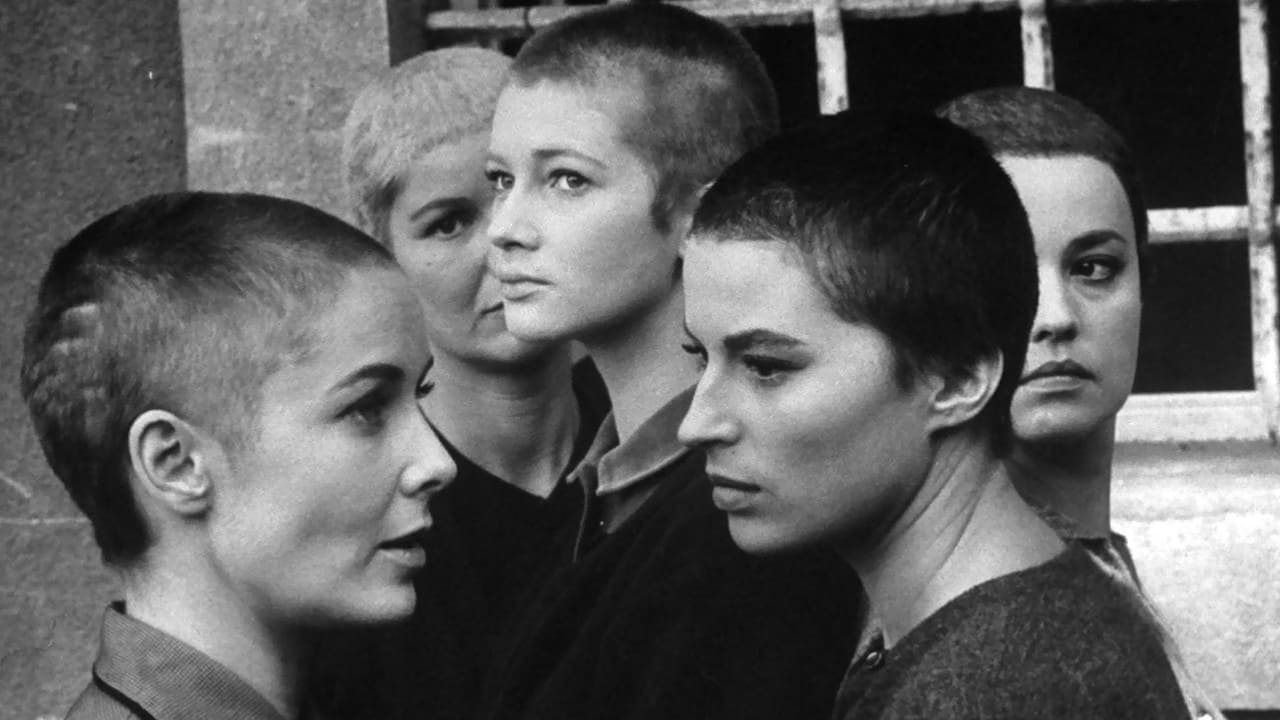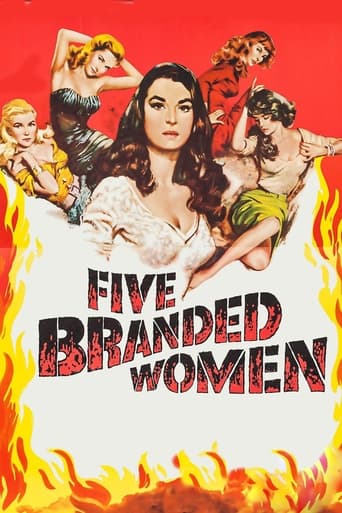Linbeymusol
Wonderful character development!
SteinMo
What a freaking movie. So many twists and turns. Absolutely intense from start to finish.
Teddie Blake
The movie turns out to be a little better than the average. Starting from a romantic formula often seen in the cinema, it ends in the most predictable (and somewhat bland) way.
Francene Odetta
It's simply great fun, a winsome film and an occasionally over-the-top luxury fantasy that never flags.
Robert J. Maxwell
Martin Ritt, the director, seemed to handle more than his share of films about contradictory cultural allegiances, and he reveled in them. His background may have had something to do with the interest that developed into his skill. A prep-school educated New York Jew, he played football for Elon College, founded by the United Church of Christ in North Carolina. One wonders what went through his head in the rural South of the 1930s, in the midst of the Great Depression. Whatever it was, it must have contributed to his handling of the textile mills in "Norma Rae." Later, he was swept up in the Red scare of the early 50s and briefly blacklisted when accused by a grocer in Syracuse of donating money to communist China in 1951.Actually, although all of that biographical stuff may sound irrelevant to the exhibit before us, it's not. Judging from his films, Ritt's stint in the poverty-stricken racist South didn't infuse him with a particularly leftist point of view or a hatred of Southerners or capitalism or anything so simple minded. Instead, it seems to have sensitized him to the problems of poverty itself, and ignorance and divided allegiances. It was a complicated dynamic.I'm trying to get out from behind this damned lectern but my shoe seems to be caught on something. Let me give it another tug. There.A handful of famous international female stars in an occupied Yugoslavian village in 1943 are accused of having had what the French of the period called "collaboration horizontale" and Keats called the "season of mists and mellow fruitfulness", with German troops, and specifically with Steve Forrest, an arrogant womanizer who gets the same treatment from the furious villagers as Abelard got for lusting after Heloise.The errant girls get their heads shaved and booted out of town, following which they have more adventures on their journey than Huckleberry Finn. They fall in with a group of Yugoslav partisans fighting the Germans. The partisans have one rule above all others. No fraternizing among the men and women. Or else. Some men, though, are prompted by their glands to act like satyrs grazing on the lawns, and shall with their goat-feet dance the antic hay. Of course, Vera Miles has to go and willingly fraternize with Harry Guardino, who sheds his usual earnest Italian-American screen persona for a properly goatish performance. "We could die tomorrow," he tells the frightened Vera Miles before throwing himself on her. As a matter of fact, he's right, because the partisan leader, Van Heflin, catches them the next morning.Van Heflin is quite good. He usually is, despite his beetling brows and pop eyes. He has an especially good moment when there is a pause in the battling and intrigue and Sylvana Mangano bitterly accuses him of caring about nothing but killing. Heflin has no ready answer. He pauses, gulps, manages to say, "I want . . .", and then quickly walks away. It doesn't sound like much but it's a very neat little scene.There are quite a few scenes in which the women and the partisans talk about human nature, killing, violence, and will there ever be peace or will the war just go on and on and on? The philosophy is strictly routine, and if it weren't for minor touches in the direction and some of the acting -- Jeanne Moreau and Richard Baseheart -- the film would be more ordinary than it is. Carla Gravina has a tall, fey presence that's almost worth the price Steve Forrest pays for impregnating her. Barbara Bel Geddes is miscast. She's not a Yugoslav peasant in black stockings and German boots. She's the well-bred, middle-class illustrator of "Vertigo" and the well-bred, middle-class wife of a Public Health Service officer in "Panic in the Streets." I'm sorry. I just don't see her rolling around in a muddy pig style with some German enlisted man.I don't know why, but I remember seeing this with my brother in a theater on North Broad Street in Elizabeth, New Jersey, when it was released. Something to do with long-term memory. Tell me, Doc, is my hippocampus turning into flan? Give it to me straight. I can take it.
secondtake
5 Branded Women (1960)This is a pretty amazing film right from the start, and it doesn't let up. It's a horrifying war movie with five women the victims and sometimes heroes in it. It shows the brutality of guerrilla fighters against the German army, and it shows WWII in Yugoslavia, without an American or Russian in sight. It's even well made, filmed in wide screen black and white in 1960, and it stars several absolute marquee actresses.In many ways this is an unusual and necessary and brave movie, and the American director, Martin Ritt, had already proved his abilities with serious themes. So why does it have such a low reputation? Yes, it gets a little preachy sometimes, and it doesn't seem completely believable in a few instances of high drama. There is a good but merely good directing and editing, so the events are sometimes oddly lackluster, or maybe held at a distance and made slightly false.But some of these complaints are only moderately true. And even more, there are themes here that are completely counterbalancing and make it worth the viewing. I don't mean for action film war scenes, but for the interior of war, and for another side to the rotten, expansive Nazi decade. This does not romanticize the situation, and in fact there is no romance to hook the viewer at all (which is no flaw, but may explain a certain lack of success with audiences). That is, it's not actually a very warm or entertaining movie. If you take at all seriously what is happening to these women you'll be horrified, and for a Hays Code era movie (though an Italian Dino de Laurentiis production, which helped), it pushes the tender envelope just enough.To be sure, there is some really good acting here. The lead male is the unlikely leading male actor who I have grown to really like, Van Heflin. When he first appears he seems overblown, but as the movie continues he settles into his role as a weary, determined rebel leader in the mountains really well. (The one other man plays a German, Richard Baseheart, and he doesn't get enough to do, unfortunately, because his presence if important.)The five women have all been accused of "sleeping with the enemy," loosely called fraternizing. I won't even give away the start of the movie here because it comes as a shock, but it's fair to say the women are forced into a world of their own. They don't trust each other in particular, but they gradually come to need each other to survive. Among them are some huge talents: Jeanne Moreau (between her two most famous films, "Elevator to the Gallows" and "Jules and Jim") and Barbara Bel Geddes (famous as the second woman in "Vertigo" but more amazing in the great Ophuls film, "Caught"). But it's the less known Italian actress Silvana Mangano (married to the producer) who has the leading part and who gives the most involved and critical performance--she represents the trap of young women in the war the best, wanting love, hanging on the idealism, not understanding (or refusing to accept) the brutality that comes with war beyond the front lines. As the war moves from the town to camps in the hills (it was filmed in Italy and Austria) to run-ins with the enemy and back to town for a big finale, the drama is great. Maybe the overall theme was so huge and so laced with forbidden elements it was impossible, in 1960, to make a truly fair and wrenching movie. But Ritt has tried. If this isn't a lost masterpiece, it's still a really excellent WWII film and should be on short lists along with the usual films that also, on close watching, have their limitations. You could easily slam the content here for what it doesn't do, for the things Ritt doesn't say through the story. (The New York Times review from 1960 does exactly that, very nicely.) In fact, the story is begging to be remade, without limitations, and we'd get a harrowing and beautiful story that really bothers the viewer directly. Instead, so far, we have a movie whose ideas bother the viewer, which is something a little more indirect.
ejmartiniak
This film is one of the least known gems to come from producer Dino de Laurentiis. Five women in war-torn Yugoslavia have their heads shaved for having intimate relations with a German soldier. The five bond and eventually join the partisan group who punished them back in their village. The film documents their fight against the enemy of their homeland, and their internal feelings of remorse, love, and hate. The women all give stellar performances--Silvana Mangano, Barbara Bel Geddes, Vera Miles, Jeanne Moreau, and young Carla Gravina. Van Heflin and Harry Guardino also deliver fine performances, as the leader of the Yugoslav partisan group and the troublemaker of the partisans, respectively. But perhaps the most touching performance comes from Richard Basehart as the German Captain Erich Reinhardt. In the little screen time he has, Mr. Basehart delivers a gem, bringing poignantly to life a gentle widower, plucked from his comfortable life as a university professor to fight in the war. He is captured by the partisans, and bonds with the 5 Branded Women who have been accepted into their group. He had shown sympathy for the women in the beginning of the film after their disgrace was made public, and in captivity, he bonds with them, particularly Mira (Carla Gravina),(whose baby he delivers) and Ljuba (Jeanne Moreau),(who finds herself in danger of falling for him). It takes a special talent to make you care for a character who is supposed to be a "bad guy", and to do it in less than ten minutes of total screen time is an art form. Mr. Basehart was indeed an artist. This is just one touching instance of the emotional exploration of the characters in this movie. Each character comes to life. A very little known film, but a must see. The action and emotion is raw and realistic throughout.
Michael O'Keefe
Just short of two hours is lengthy for 1960. This melodrama is set in Middle Europe during WW2 and does have its moments. Five young women are scorned and humiliated for consorting with Nazis. Now with shaved heads, they band together to prove their patriotism and set out to fight the Germans. The resistance fighters don't want their help; so they seem to be fighting both forces...plus themselves. Strange casting is very obvious; and this moody movie may be hard for some to get into. War buffs will watch. I watched because of the enticing Vera Miles. Beside Miss Miles the very diverse cast includes: Barbara Bel Geddes, Silvana Mangano, Van Heflin, Richard Basehart, Jeanne Moreau and Steve Forrest. War causes people to do regrettable things.

